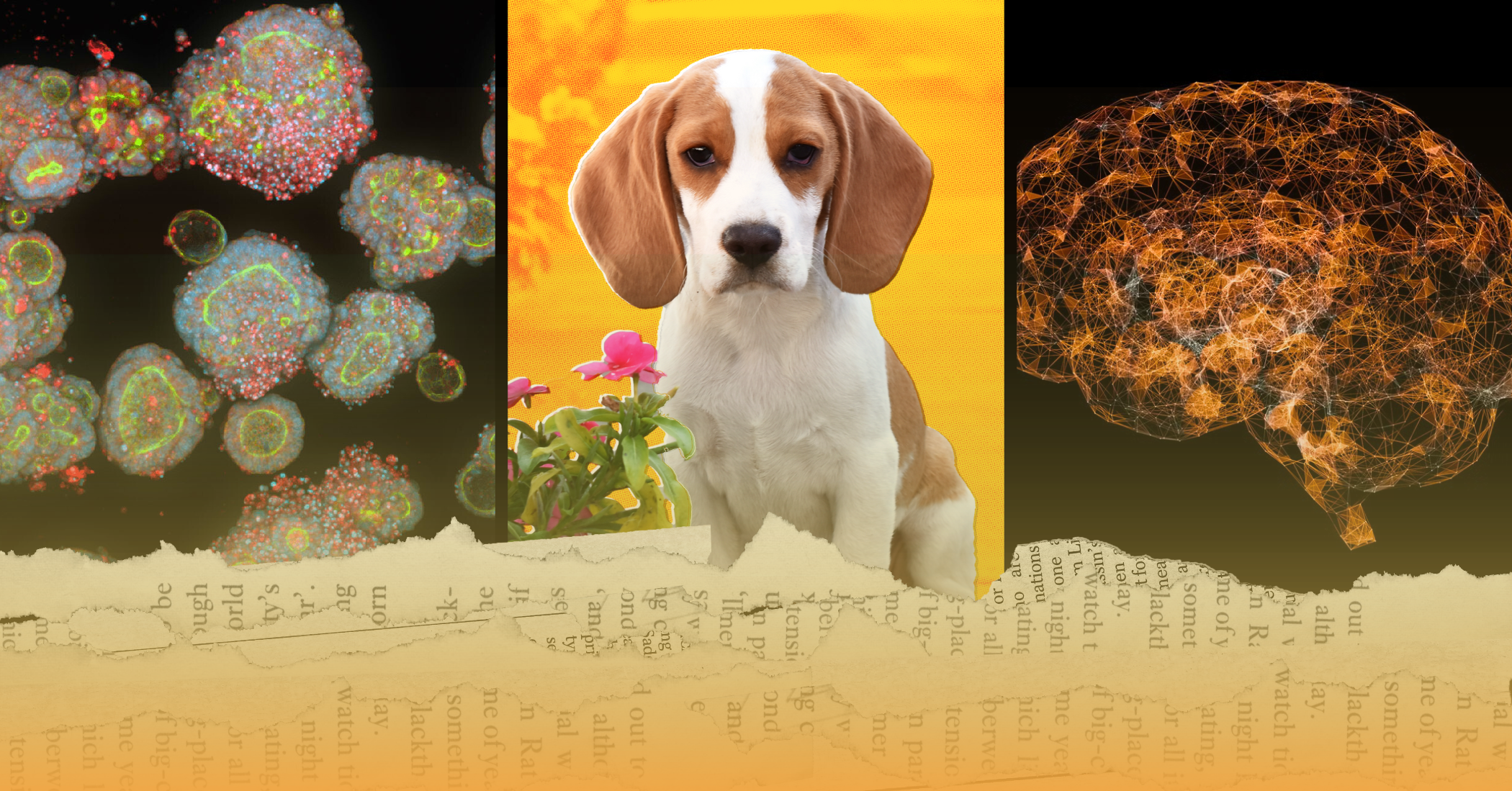
While the animal research industry continues to breed, buy, cage, torture, and kill sentient beings, progressive scientists are busy proving that human-relevant science is not only possible but, in fact, better for us all. Highlights in science from the last month are below.
No Brains, No Pain; Scientists Aim to Grow ‘Spare’ Human Bodies in the Lab For Medical Miracles
Arezki Amiri, Daily Galaxy, 4/3/2025
“Researchers at Stanford University have proposed a concept that could transform modern medicine: lab-grown human ‘bodyoids’ created entirely from stem cells and developed without consciousness. These engineered bodies, which lack the capacity for awareness or pain, could potentially provide an unlimited supply of organs for transplantation, eliminate much of the need for animal testing, and enable the development of highly personalized medical treatments.” 📰 Full Story →
3D-printed ‘skin’ may end animal testing for cosmetics and drugs
Mudit Dube, NewsBytes, 4/4/2025
“Researchers . . . are developing a synthetic ‘skin’ by layering 3D-printed hydrogel with living human cells. The novel technique seeks to mimic human skin’s reaction to different substances, possibly putting an end to animal testing in the cosmetics and pharmaceutical industry.” 📰 Full Story →
Scientists behind unique laboratory gut model raise funds for further expansion
Pharmiweb.com, 4/7/2025
“A UK biotech company whose unique laboratory gut model is used to trial new drugs and foodstuffs without the need for animal testing has raised a further £750,000 . . . Aelius provides testing services for consumer health, pharmaceutical and ‘functional food’ companies including Huel. It models how substances will be digested by the body to help customers to de-risk product development and improve formulations. Aelius’s model is the only one of its type that can simulate all three stages of the digestion process….” 📰 Full Story →
Scientists recreate brain’s pain circuit in world first
Anthony Cuthbertson, The Independent, 4/10/2025
“Scientists have recreated the brain circuit responsible for transmitting feelings of pain for the first time. The breakthrough, made by a team at Stanford University in the US, could help with developing better treatments for pain disorders. The mapping of pain pathways in a lab dish could also allow experiments and tests to be conducted on nerve circuits without causing pain to laboratory animals.” 📰 Full Story →
In Vitro Human Models Grown Up
MaryAnn Labant, Genetic Engineering & Biotechnology News, 4/10/2025
“Organoids, microphysiological systems (MPS), and organ-on-a-chip (OOC) devices continue to make steady progress and proceed down the path to technology maturity . . . Although these in vitro models will also not substitute totally for their in vivo counterparts, the benefits over non-human models are clear . . . Current limitations of in vitro human models do not take away from their ethical reduction of animal use nor their potential to provide more realistic in vitro human responses in preclinical testing.” 📰 Full Story →
Certara Launches Non-Animal Navigator™ Solution to Help Drug Develops Reduce Reliance on Animal Testing
Certara, Global Newswire, 4/14/2025
“Certara, Inc. (Nasdaq: CERT), a global leader in model-informed drug development, [] announced the launch of its Non-Animal Navigator™ solution designed to help biopharmaceutical companies lead the transition ignited by the FDA’s Roadmap to Reducing Animal Testing in Preclinical Safety Studies.” 📰 Full Story →
Pee Size: The Israeli Neuroscientist Turning Urine Samples Into Miniature Brains
Ruti Levy, Haaretz, Queen Mary University of London, 4/24/2025
“Using urine samples taken from autistic children, Nisim Perets and his team are constructing miniature brains capable of learning, responding and reflecting the brain functions of the person they were taken from” as “part of an effort to bridge the frustrating gap between scientific research and actual patients . . . Perets believes the problem is not just about chemical composition – it’s the model itself. Mice do not encode information like humans, and therefore cannot be expected to reflect a human reaction to the drug. Instead, he proposes using a miniature human brain.” 📰 Full Story →
Game-Changing ‘Patients-On-A-Chip’ Tech Exposes Drugs That Secretly Harm the Brain
StudyFinds Staff, StudyFinds, 4/24/2025
“ . . . scientists at Quris Technologies have uncovered evidence that some drugs become significantly more harmful to brain cells after being metabolized by the liver. The findings, published in Biomedicine & Pharmacotherapy, could change how we evaluate drug safety — and explain why some medications cause unexpected neurological side effects that animal testing often misses . . . For their investigation, the team built a cutting-edge laboratory system called BioAI that mimics what happens when drugs travel through the human body — what they describe as ‘patients-on-a-chip . . . Instead of using flat petri-dish cell layers or animal models, the researchers created 3D mini-organs from human cells.” 📰 Full Story →
Tempus unveils platform to speed up pre-clinical drug development
Marta Rybczynski, FirstWord PHARMA, 4/28/2025
“Tempus AI has launched a new platform, Tempus Loop, aimed at improving the identification and validation of cancer drug targets. The platform combines real-world patient data, lab-grown tumour models and AI to help researchers identify potential treatments for specific patient groups. According to the company, a key challenge in cancer research is translating preclinical findings into effective treatments for humans. Traditional preclinical studies often rely on cell lines or animal models, which may not fully represent how cancer behaves in patients. Tempus Loop is attempting to address this issue by using patient data — such as clinical records, test results and treatment outcomes — alongside patient-derived organoid (PDO) models, providing a more biologically relevant approach to drug discovery.” 📰 Full Story →
Take Action: Support the SPARE Act to Help End Federally-Funded Animal Research
Ask your members of Congress to support the SPARE Act, a bill that aims to end federal funding of animal research. ⚠️ Take Action Now →









